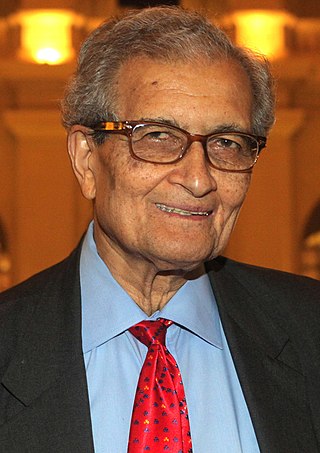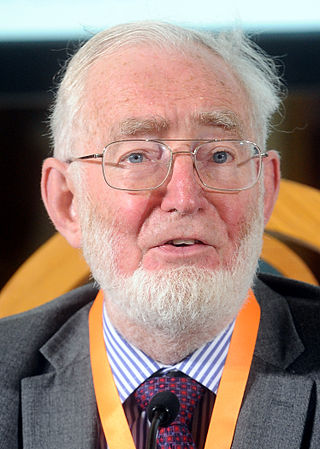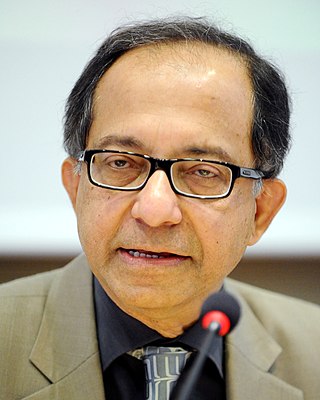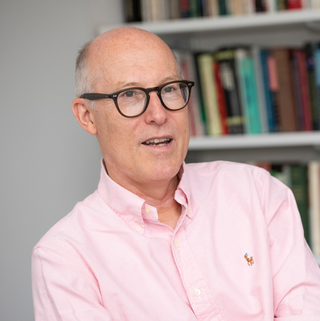
Economic history is the study of history using methodological tools from economics or with a special attention to economic phenomena. Research is conducted using a combination of historical methods, statistical methods and the application of economic theory to historical situations and institutions. The field can encompass a wide variety of topics, including equality, finance, technology, labour, and business. It emphasizes historicizing the economy itself, analyzing it as a dynamic entity and attempting to provide insights into the way it is structured and conceived.

Amartya Kumar Sen is an Indian economist and philosopher, who has taught and worked in the United Kingdom and the United States since 1972. Sen has made contributions to welfare economics, social choice theory, economic and social justice, economic theories of famines, decision theory, development economics, public health, and measures of well-being of countries.

Jagdish Natwarlal Bhagwati is an Indian-born naturalized American economist and one of the most influential trade theorists of his generation. He is a University Professor of economics and law at Columbia University and a Senior Fellow in International Economics at the Council on Foreign Relations. He has made significant contributions to international trade theory and economic development.
Jean Drèze is a Belgian-born Indian welfare economist, social scientist and activist. He has worked on several developmental issues facing India like social welfare, poverty and gender inequality.

Sir Anthony Barnes Atkinson was a British economist, Centennial Professor at the London School of Economics, and senior research fellow of Nuffield College, Oxford.

Willem Hendrik Buiter CBE is an American-British economist. He spent most of his career as an academic, teaching at various universities. More recently, he was the Chief Economist at Citigroup.

Kaushik Basu is an Indian economist who was Chief Economist of the World Bank from 2012 to 2016 and Chief Economic Adviser to the Government of India from 2009 to 2012. He is the C. Marks Professor of International Studies and Professor of Economics at Cornell University, and academic advisory board member of upcoming Plaksha University. He began a three-year term as President of the International Economic Association in June 2017. From 2009 to 2012, during the United Progressive Alliance's second term, Basu served as the Chief Economic Adviser to the Government of India. Basu is winner of the Humboldt Research Award 2021.

Sir Timothy John Besley, is a British academic economist who is the School Professor of Economics and Political Science and Sir W. Arthur Lewis Professor of Development Economics at the London School of Economics (LSE).

Branko Milanović is a Serbian-American economist. He is most known for his work on income distribution and inequality.
Bagicha Singh Minhas (1929-2005) is an Indian economist.

The Institute of Development Studies (IDS) is a research and learning organisation affiliated with the University of Sussex in Brighton, England, and based on its campus in Falmer, East Sussex. It delivers research and teaching in the area of development studies.

Pranab Bardhan is an Indian economist who has taught and worked in the United States since 1979. He is Professor Emeritus of Economics at the University of California, Berkeley.
Sanjaya Lall was a development economist and Professor of Economics at the University of Oxford. Lall's research interests included the impact of foreign direct investment in developing countries, the economics of multi-national corporations, and the development of technological capability and industrial competitiveness in developing countries. One of the world's pre-eminent development economists, Lall was also one of the founding editors of the journal Oxford Development Studies and a senior economist at the World Bank.

Sugata Marjit is the former Vice Chancellor of the University of Calcutta and currently the First Distinguished Professor at Indian Institute of Foreign Trade and the Project Director of Centre for Training & Research in Public Finance and Policy (CTRPFP) [A Ministry of Finance, Government of India funded initiative]. He is a Ph.D. at the University of Rochester and currently the Editor of South Asian Journal of Macroeconomics and Public Finance. He used to be the Director of Centre for Studies in Social Sciences, Calcutta from March 2007 to March 2012 and Reserve Bank of India Chair Professor of Industrial Economics at CSSSC till September, 2019. On 15 July 2015 he took the charge as an interim Vice-Chancellor of the prestigious University of Calcutta, Kolkata, India.

The International Growth Centre (IGC) is an economic research centre based at the London School of Economics, operated in partnership with University of Oxford's Blavatnik School of Government.
Sanjiv M. Ravi Kanbur, is T.H. Lee Professor of World Affairs, International Professor of Applied Economics, and Professor of Economics at Cornell University. He worked for the World Bank for almost two decades and was the director of the World Development Report.

Stuart Edward Corbridge, FRGS is a British geographer and academic specialising in geopolitics, development studies, and India. From September 2015 to July 2021, he was Vice-Chancellor and Warden of Durham University. From 2013 to 2015, he was Provost and Deputy Director of the London School of Economics. He was also Professor of Development Studies at LSE.
Tirthankar Roy is an Indian economic historian and Professor of Economic History at the London School of Economics. He is a researcher of the Economic History of South Asia and India, having published over 25 books and numerous articles. His work spans the fields of Economic History, Business History and Social History, particularly studying the effects of British colonialism in India on its economic development.
The Department of Economics is an academic department of the University of Oxford within the Social Sciences Division. Relatively recently founded in 1999, the department is located in the Norman Foster-designed Manor Road Building.













